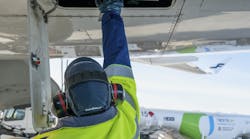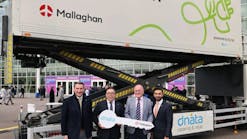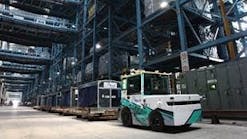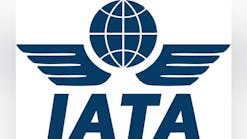dnata Further Reduces Carbon Footprint with Fleet-Wide Transition to Biodiesel in UAE
dnata, a leading global air and travel services provider, announced a major milestone in its environmental sustainability journey. All of the company’s non-electric airside vehicles and ground support equipment (GSE) are now operating exclusively on a biodiesel blend at its biggest operational hub in Dubai.
This significant step, taken in partnership with Dubai Airports and the Emirates National Oil Company Group (ENOC), is projected to cut CO₂ equivalent emissions by over 3,500 tonnes annually over the lifecycle of the fuel consumed by dnata’s fleet. This is equivalent to over 21 million kilometres driven by an average diesel-powered car.
The initiative has been gradually rolled out across dnata’s extensive ground handling and cargo operations at the two Dubai airports, Dubai International (DXB) and Al Maktoum - Dubai World Central (DWC). It involves a total of 2,500 vehicles, which support the safe and timely operations of over 220,000 flights annually.
dnata has been already using a blend of biodiesel across its landside fleets at dnata logistics, City Sightseeing Tours, Arabian Adventures, and Alpha Flight Services in the UAE since last summer.
Steve Allen, CEO of dnata Group, said: “Our latest initiative to switch all our non-electric airside vehicles to biodiesel in Dubai is a big step forward in our decarbonisation journey. It demonstrates our dedication to cutting emissions, a core part of our environmental strategy, while maintaining the highest level of quality and safety across our operations.
This achievement wouldn’t be possible without the strong collaboration with Dubai Airports and ENOC, who share our commitment to contributing to the UAE Government’s Net Zero 2050 strategic initiative. We look forward to continuing our partnership to further reduce our environmental footprint and make a positive impact on the aviation industry.”
Paul Griffiths, CEO of Dubai Airports, said: “Sustainability in aviation requires everyone to pitch in, and as the airport operator, we're committed to driving change. Our partnership with dnata and ENOC to introduce biodiesel highlights how collaboration can lead to real progress. While sector-wide solutions are crucial, airports must also score quick wins on the ground.
“This shift will benefit all operators of vehicles and equipment operating airside by replacing traditional diesel with a cleaner alternative. Given the significant size of dnata’s fleet both at DXB and DWC, we know this project is vital for a broader sustainable ground support equipment (GSE) strategy, and we're proud to contribute to reducing dnata’s emissions and setting a new standard for the aviation industry.”
ENOC Group has provided dedicated biofuel trucks and fuel stations to support dnata’s transition into biodiesel in Dubai.
Saif Humaid Al Falasi, Group CEO at ENOC, said, “We are delighted to continue our ongoing cooperation with dnata by delivering biodiesel to their airside fleet and ground support equipment (GSE). This partnership underscores ENOC Group’s commitment to expedite the UAE’s transition to clean and sustainable energy sources under the National Policy on Biofuels. We look forward to enabling clean energy alternatives to further diversify the national energy mix.”
dnata: a Key Contributor to the UAE’s Aviation Industry
Since its foundation in 1959, dnata has been playing an important role in the UAE’s aviation industry. Having mirrored Dubai’s growth, the dnata Group presently employs over 23,000 staff and serves over 190 passenger and cargo airlines across the country. Besides its range of air services, dnata operates all airside fuel stations and mobile refuelling services at both Dubai airports.
Significant Improvement Across dnata’s Global Businesses
dnata recently reported significant improvements across key environmental performance metrics for the financial year 2023-24. As a result of its consistent approach and initiatives, the company cut the carbon intensity of its operations by over 8%, 22% and 26% across its airport operations, travel and catering businesses, respectively. All data has been validated by Verifavia, an independent accredited environmental verification and auditing body.
Reducing Emissions through Investment in Infrastructure, Fleet and Technologies
dnata minimises emissions across its businesses using renewable energy where available, and in some markets, such as the UK and Ireland, it exclusively procures solar and wind energy. Most recently, it has installed solar panels in Pakistan and the Philippines to avoid consuming fossil-fuel powered electricity across several facilities. In the financial year 2023-24, dnata generated 21% more renewable energy and purchased 191% more renewable electricity, than in the same period the previous year.
dnata consistently invests in its modern fleet to improve environmental efficiency. Its fleet strategy commits to phasing out diesel-operated engines and switching to hybrid, electric, or hydrogen wherever airports have provided the necessary infrastructure. As a result of its investments in recent years, 65% of dnata’s fleet is now electric in the Netherlands, 44% in Italy, 40% in the UK, and 39% in Switzerland.
dnata also maintains a strong focus on minimising fuel consumption. It monitors the consumption of fuel across its fleet of ground support equipment (GSE) using Vehicle Tracking Management systems; conducts logistics mapping exercises to ensure minimal distances are travelled airside; and optimises shifts and parking slots to avoid excessive fuel burn.
In addition, it tracks the behaviour of drivers, including vehicle idling times, and has key performance indicators linked to the environmental management system. dnata promotes more responsible driver behaviour through education, awareness and training.
IATA’s IEnvA Certification
In September 2023, dnata became the first combined air services provider to receive the International Air Transport Association’ (IATA) environmental management certification as a recognition of its unwavering commitment to sustainability across its diverse portfolio of businesses in the United Arab Emirates (UAE).






